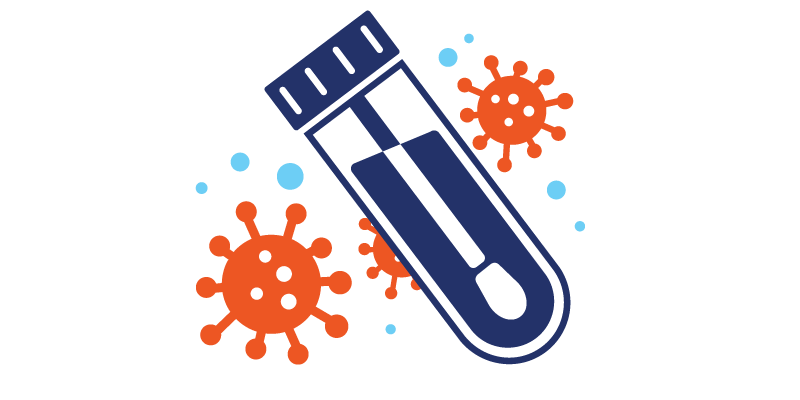Quarantine and Isolation Guidelines
If you have tested positive for COVID-19...
Those who have tested positive for COVID-19 will be asked to isolate themselves to avoid spreading the virus.
If you live on campus...
Please call your RA or the front desk of your residence hall to inform them you have tested positive for COVID-19.
As of May 13, 2022, MSU no longer has isolation housing for students. CDC still recommends that students limit their exposure to others by staying in their residence hall room for the recommended period of time. If a student is able to travel home by private vehicle or isolate off-campus, it is recommended that they do so.
Tips to prevent the spread of COVID-19 while you're isolating in the residence halls:
- Wear a mask.
- Avoid face to face interactions.
- Wash your hands often.
- Avoid common areas.
- Ask your RA to help have your meals dropped off at your door.
If you live off campus...
Stay home and avoid others, and follow the CDC's recommended guidelines for isolation.
Contact tracing
Montana State University and the Gallatin City-County Health Department (GCCHD) have implemented an electronig system to assist with public health contact tracing.
If you receive a positive COVID-19 test result from the SHP Medical Services clinic, you will receive a link to an online survey interview on your patient portal. This link will also provide isolation and quarantine guidance. This questionaire takes approximately five minutes to complete. If you feel more comfortable calling GCCHD's COVID-19 call center, please do so at 406-582-3163.
You can leave isolation when you have met all of the following conditions, as laid out by the Centers for Disease Control and Prevention:
- It has been at least five days since your symptoms began.
- You’ve seen your symptoms improve.
- You have not had a fever of 100.4 degrees Farenheit or higher in the last 24 hours — without using fever-reducing medications.
- Only leave the house for medical emergencies. You should not go to work, class, the grocery store, on hikes or walks, or into the community, etc.
- Stay separated from other people and pets in your home, as much as possible.
- Wear a face mask at all times when you are around other people or pets.
- Don’t share food, drinks, dishes, eating utensils, towels or bedding with other people or pets.
- Use a separate bathroom, if possible.
- Wash dishes, towels and bedding thoroughly and dry them on the hottest appropriate setting.
- Use household disinfectants to regularly clean high-touch surfaces, including counters, doorknobs, bathroom fixtures, toilets, phones, remote controls, keyboards, tablets and bedside tables.
- Cover your mouth and nose with a tissue when you cough or sneeze, place the used tissue in a lined trashcan. Wash your hands right away with soap and water for at least 20 seconds or clean your hands with a nickel-size amount of alcohol-based hand sanitizer.
The only exception to remaining isolated, according to Montana law, is attending or operating a religious facility, church, synogogue or other place of worship.
There is no known antiviral treatment for COVID-19, so treatment is primarily supportive care. Mild cases may be treated at home, but severe illness requires hospitalization. You can do several things that will help you feel better while you are recovering on your own.
- Get extra sleep.
- Drink lots of liquids like juices, broth and soda.
- For vomiting: Do not eat or drink anything till you have not vomited for four hours, then sip on liquids for 24 hours. If no further vomiting, begin eating mild foods like crackers, mashed potatoes, rice, applesauce, for 24 hours. Then resume your regular diet.
Complications from viral respiratory syndromes can be serious. If you develop shortness of breath, chest pain, uncontrolled vomiting or stiff neck you will likely need to be rechecked. However, it is of utmost importance to call ahead to SHP Medical Services, Urgent Care, or the Bozeman Health Emergency Room before you travel to minimize the potential spread of COVID-19.
If your symptoms worsen, you can go to:
- Student Health Partners, 100 Swingle Building, Monday to Friday, 8:30 a.m. to 4:30 p.m.; call 406-994-2311 for an appointment.
- Bozeman Health
- B2 Urgent Care
- Bozeman, 1006 W. Main St., 8 a.m. to 7 p.m. daily
- Belgrade, 206 Alaska Frontage Road, 8 a.m. to 7 p.m. daily
Please wear a face covering and notify staff that you have been diagnosed with COVID so that the health care team can use proper precautions.
If you have been exposed to someone with COVID-19...
There are a few possibilities to consider depending on your vaccination status.
You're fully vaccinated
If you have been boostedor have been vaccinatedbut received your primary series less than 6 months ago (for mRNA) or less than 2 months ago (for Janssen) and are a close contact of someone who has tested positive for COVID-19, the Gallatin City-County Health Department (GCCHD) does not recommend that you quarantine. However, GCCHD does recommend that you:
- Get tested 5 days after your exposure even if you do not have symptoms.
- Wear a mask while indoors, even around those you live with, for 10 days following exposure.
- Get tested at any time if you develop symptoms.
You're fully vaccinated but work in a a health care setting
If you are fully vaccinated and are a close contact and work in a health care setting (clinic, hospital, long-term care facility, pharmacy, etc.), you should check with GCCHD and your employer for guidance before returning to work.
You're not fully vaccinated
If you are not fully vaccinated, or received your primary series over six months ago (for mRNA) or over two months ago (for Janssen) and have not received a booster, and are a close contact of someone who has tested positive for COVID-19, GCCHD strongly recommends you quarantine for five days; get tested 5 days after your exposure even if you do not have symptoms; wear a mask while indoors, even around those you live with, for 10 days following exposure; and get tested at any time if you develop symptoms.
Common questions
Length of quarantine depends upon several factors, including your vaccination status and whether you had confirmed COVID-19 in the prior 90 days. Because of the complex decision and frequent updates from the CDC, we recommend that you go to the CDC Quarantine and Isolation webpage for advice.
Please stay away from others in your home (including those also in quarantine or isolation) and follow these guidelines to protect those in your household:
- You will not be able to go to work, class, the grocery store, on hikes or walks, or into the community, etc.
- Stay separated from other people and pets in your home, as much as possible.
- Wear a face mask at all times when you are around other people or pets.
- Don’t share food, drinks, dishes, eating utensils, towels or bedding with other people or pets.
- Use a separate bathroom, if possible.
- Wash dishes, towels and bedding thoroughly and dry them on the hottest appropriate setting.
- Use household disinfectants to regularly clean high-touch surfaces, including counters, doorknobs, bathroom fixtures, toilets, phones, remote controls, keyboards, tablets and bedside tables.
- Cover your mouth and nose with a tissue when you cough or sneeze, place the used tissue in a lined trashcan. Wash your hands right away with soap and water for at least 20 seconds or clean your hands with a nickel-size amount of alcohol-based hand sanitizer.
- If you have a medical appointment, call ahead and tell the provider that you are a close contact of someone with COVID-19.
- After leaving quarantine, you should continue to monitor symptoms for an additional four days. If symptoms develop at any time during the 14-day incubation period, you must remain in or return to quarantine and get tested.
- If you begin developing symptoms, go to the MSU Symptomatic Student Testing center for a free COVID-19 test.
Watch yourself for emergency warning signs
If you develop emergency warning signs for COVID-19, get medical attention immediately. Please call 911. Emergency warning signs may include trouble breathing, persistent pain or pressure in the chest, new confusion or inability to arouse, and bluish face or lips. Make sure to tell the dispatcher your symptoms so responders are prepared.
Frequently Asked Questions
Below you will find answers to some of the questions MSU students most frequently ask about quarantine and isolation.
Only individuals with a confirmed positive test result within 90 days of their quarantine release date may be exempt from quarantine or individuals who are two weeks past receiving the entire series of their COVID-19 vaccine. Visit the CDC's website for the most updated information about the entire vaccination series.
Yes, if you are able to drive home safely and stay off campus without exposing others, it is recommended that you travel home to isolate yourself.
Limit your exposure and talk to your RA about your options.
Student Health Partners currently has the capacity to test close contacts on the fifth
day of their quarantine. If you receive a negative test result, you may be released
from quarantine on day seven.
You will receive your letter through the Gallatin County Health Department when you complete the jotform link sent to you through email or text message. For more assistance call the COVID call center Monday–Friday, 8 a.m. to 5 p.m. at 406-582-3163.
Because incidents out of our control can occur, we ask that you do not use curbside pickup but choose a home delivery option instead. See our Resources page for more information on food assistance.
Call your pharmacy to see if they offer delivery or curbside pickup and make arrangements with your pharmacy. You could also arrange for a friend or family member to pick up your prescription (make sure to call your pharmacy ahead of time to let them know your plan).
Yes! Please see our Resources page where you can request an outreach from someone on our team at MSU’s Counseling and Psychological Services.
More COVID-19-related answers can be found on our main Frequently Asked Questions page.
Additional Links
- MSU COVID-19 Self-Checker – A step-by-step tool that can help students determine whether testing is appropriate and where to go for a COVID-19 test.
- MSU Student Testing Center – MSU offers COVID-19 testing to students free of charge. Testing is available for students who have symptoms of COVID-19.
- Quarantine Resources – links to help from MSU's Counseling and Psychological Services and to options for academic support and more.
- MSU Housing Information – As of May 2022, MSU no longer has separate Quarantine and Isolation housing. If you live on-campus and test positive, please contact your RA for advice.
- COVID-19 Vaccines – Information on vaccine options and where to obtain one locally.
Last Updated: March 21, 2023


